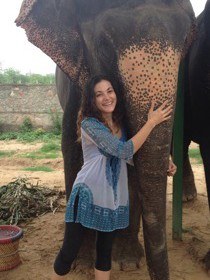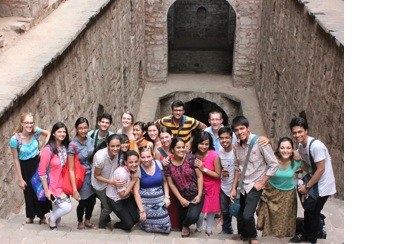Posted: October 19, 2014
In a country rich in unity, culture, diversity, and natural resources, one could spend a lifetime working for and transforming the lives of millions.

As I approached my senior year at Penn State, I knew the opportunity to study abroad was quickly dwindling away. I decided to travel to India for my summer vacation in order to build a global perspective and make the most of a college experience abroad, however short of a time it may have been.
Before traveling to India, I had formed multiple expectations of what I was going to learn. Ultimately, you can never prepare for something you've never been exposed to. I imagined a mental venn diagram of similarities and differences between the Indian and American ways of life. In PSYCH 497H and INTST 493H, our goal was to define a concept of the self, and to analyze how a number of factors, such as government, education, and nutrition, influence human development across our nations. Not only did we accomplish our objective, but we walked away with new friends, new definitions of ourselves, and a new vision of how to apply our Penn State knowledge to the cities and people who need it most.
 Immersing oneself in another country allows one to truly feel the potential within to make a difference, as well as the frustration with the cultural barriers that hinder those same ambitions as they begin. While in Dahanu, our team of scholars stayed with a non-profit primary school called Tamarind Tree. This school formed within the past decade, but already grew into a competitive early education system for children of tribal communities. It also specialized in both environmental protection and community media within their curricular content. Being so touched with the smiles on the children's faces, and their excitement in using laptops, we decided to work together and dedicate our Fall 2014 semester to the creation of an online course for Tamarind Tree focused on gravity.
Immersing oneself in another country allows one to truly feel the potential within to make a difference, as well as the frustration with the cultural barriers that hinder those same ambitions as they begin. While in Dahanu, our team of scholars stayed with a non-profit primary school called Tamarind Tree. This school formed within the past decade, but already grew into a competitive early education system for children of tribal communities. It also specialized in both environmental protection and community media within their curricular content. Being so touched with the smiles on the children's faces, and their excitement in using laptops, we decided to work together and dedicate our Fall 2014 semester to the creation of an online course for Tamarind Tree focused on gravity.
Assigned group projects in a classroom may teach students how to collaborate on a set requirement, but teamwork within a shared dream allows scholars the opportunity to foster a true understanding of what each member can offer an employer, a community, or society as a whole. As a member of the College of Agricultural Sciences, I know that education is as important as action. Throughout my time in India, I looked around and saw the opportunity to act along every roadside, within every household, and in every set of eyes that passed me by. Pollution, nutrient management and overall environmental regulation are key factors to consider in a nation with such rapid growth. I hope to return to India after graduation and lead a project of my own toward managing the resources and waste products more effectively.
Problem solving requires a vision of the future paired with a reflection of the past. My time in India allowed me the opportunity to take an hour out of each day to reflect, journal, and to blog about what I had learned. Now, I have the new opportunity to take my newfound knowledge and apply it to my goals for the future. Despite the different way of tackling life's daily tasks, whether they involve driving to work, washing one's clothes, or nodding hello, the connections I made in India showed me the similarities people share across the world and the purpose we each have in being a part of something bigger than ourselves. In a country rich in unity, culture, diversity, and natural resources, one could spend a lifetime working for and transforming the lives of millions. I am so grateful to have gone on this trip and I thank Penn State and the College of Ag for supporting me on my journey toward discovering myself and toward discovering others.
Ag Sciences Global
Address
106 Agricultural Administration BuildingUniversity Park, PA 16802
- Email globalag@psu.edu
- Office 814-863-0249
- Fax 814-865-3055
Ag Sciences Global
Address
106 Agricultural Administration BuildingUniversity Park, PA 16802
- Email globalag@psu.edu
- Office 814-863-0249
- Fax 814-865-3055

